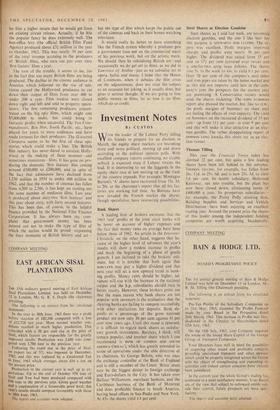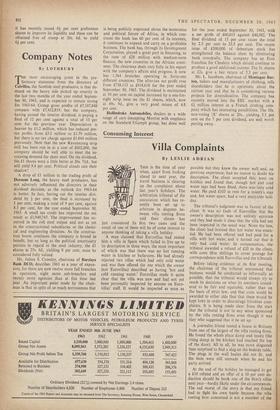Investment Notes
By CUSTOS•
Wan the leader of the Labour Party telling his friends to prepare for an election in March, the equity share markets are becoming more and more political, moving up and down according to the political opinion polls. With excellent company reports continuing, no sizable setback is expected even if Labour retains the lead. It is interesting to see the laggards in the equity share race at last moving up as the trade of the ,country expands. For example, Montague Burton's 'A' shares have recovered from I5s. 3d. to 20s. at the chairman's report that all his fac- tories are working full time. As Burtons have now invaded the French market the shares, though, speculative, have interesting possibilities.
Bank Shares
A leading firm of brokers estimates that the 1963 'real' profits of the joint stock banks will be lower on account of higher expenses, and the fact that money rates on average have been below those of 1962. An article in the Investors' Chronicle, on the other hand, suggests that be- cause of the higher level of advances the year's results show a modest increase in profits and mark the beginning of a phase of gentle growth. I am inclined to take the brokers' esti- mate, but it is notable that both agree that BARCLAYS may pay a higher dividend and that next year will set a new upward trend in bank- ing profits. Money rates should be higher, ad- vances will rise with the increase in the national output and the h.p. subsidiaries should turn in better results. However, these brokers point out that the main reason why bank shares are not popular with investors is the realisation that the clearing banks are failing to compete successfully with other institutions for deposits. Bank de- posits as a percentage of the gross national product are now only 30 per cent against 41 per cent nine years ago. Until this trend is reversed, it is difficult to regard bank shares as satisfac- tory growth investments. Barclays, I think, will remain popular, and another share which I can recommend is BANK OF LONDON AND SOUTH AMERICA •('DOLSA.), which has greatly extended its scope of operations under the able direction of its chairman, Sir George Bolton, who was once the exchange controller at the Bank of England and is still a member of the Court. 'Bolsa' must now be the biggest dealer in foreign exchange and Euro-dollars in the City. It has taken over Balfour 'Williarnson, merchant bankers, and the Caribbean business of the Bank of Montreal and does profitable finance in South America, having head offices in Sao Paulo and New York. At 43s. the shares yield 4.4 per cent.
Steel Shares as Election Gambles
Steel shares, as I said last week, are becoming election gambles, and the one I like best for this purpose is STEWARTS AND LLOYDS. The re- port was excellent. Profit margins improved sharply and profits were nearly 3(1 per cent higher. The dividend was raised from 15 per cent to 171 per cent (covered over twice) and a one-for-two scrip ksue follows. The shares rose 5s. in the week to -14s. to yield 8.1 per cent. Over 70 per cent of the company's steel tubes and iron pipes are taken b) the home market and as this did not improve until late in the com- pany's year the prospects for the current year are promising. A Conservative victory would send the shares rocketing. The RAN report also pleased the market, but, like s.c.it.W., the profit margins of Summers on sheet steel are feeling the effects of over-capacity. 'The) ield on Summers on the increased dividend of 15 per cent • up from 1,11 per cent—is over 9 per cent and this will make it also attractive as an elec- tion gamble. The rather disappointing report of DORMAN LUNG knocks this share out as an elec- tion runner.
Thomas Tilling
This year the Financial Times index has climbed 22 per cent, but quite a few leading shares have been left behind in this advance. Tnomiss ILLING, for example, has fallen from 26s. I d. to 21s. 6d. and is now 23s. 3d. to yield 3.6 per cent. Its textile subsidiary, Holyrood Knitwear, ran into trouble,. but the plant has now been closed down, eliminating losses of £400.000 a year. Its prosperous subsidiaries - for example, the Pretty Polly stocking firm, Building Supplies and Services and Vehicle Distribution—have been .enjoying an excellent trading year. Around the present price the shares of this leader among the independent holding companies are worth acquiring. Incidentally,
it has recently issued 6f per cent preference shares to improve its liquidity and these can be obtained free of stamp at 20s. 6d. to yield 61- per cent.































 Previous page
Previous page